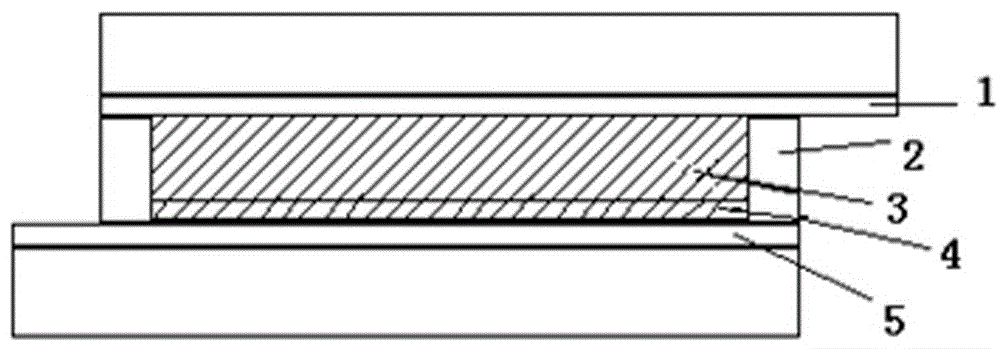A specular reflective electrochromic device and its preparation method
An electrochromic device and specular reflection technology, applied in instruments, nonlinear optics, optics, etc., can solve problems such as pushing up device costs, increasing device costs, and low reflectivity, and reducing production costs.
- Summary
- Abstract
- Description
- Claims
- Application Information
AI Technical Summary
Problems solved by technology
Method used
Image
Examples
Embodiment 1
[0036] Such as figure 1 As shown, a specular reflection electrochromic device, including transparent conductive glass 1, insulating spacer 2, gel electrolyte 3, zinc oxide (ZnO) nanocrystal 4 and zinc aluminum oxide (AZO) arranged from top to bottom Transparent conductive glass 5, wherein zinc oxide nanocrystals are deposited on the electrode of zinc oxide aluminum transparent glass 5 to form a rough surface, the surface of transparent conductive glass 1 is a smooth transparent electrode; gel electrolyte 3 is packaged with packaging material; The electrolyte 3 is located between the transparent conductive glass 1 and the zinc-aluminum oxide transparent conductive glass 5 , and the insulating spacer 2 is used to ensure a small distance between the transparent conductive glass 1 and the zinc-aluminum oxide transparent conductive glass 5 . The preparation method uses AZO conductive glass as the substrate and zinc acetate as the zinc source to prepare zinc oxide nanocrystals. The ...
Embodiment 2
[0043] Such as figure 1As shown, a specular reflection electrochromic device, including transparent conductive glass 1, insulating spacer 2, gel electrolyte 3, zinc oxide (ZnO) nanocrystal 4 and zinc aluminum oxide (AZO) arranged from top to bottom Transparent conductive glass 5, wherein zinc oxide nanocrystals are deposited on the electrode of zinc oxide aluminum transparent conductive glass 5 to form a rough surface, the surface of transparent conductive glass 1 is a smooth transparent electrode; gel electrolyte 3 is packaged with packaging material; The glue electrolyte 3 is located between the transparent conductive glass 1 and the zinc-aluminum oxide transparent conductive glass 5, and the insulating spacer 2 is used to ensure a small distance between the transparent conductive glass 1 and the zinc-aluminum oxide transparent conductive glass 5. The preparation method uses AZO / Ag / AZO three-layer structure thin film conductive glass as the substrate, zinc nitrate as zinc so...
Embodiment 3
[0049] Such as figure 1 As shown, a specular reflection electrochromic device, including transparent conductive glass 1, insulating spacer 2, gel electrolyte 3, zinc oxide (ZnO) nanocrystal 4 and zinc aluminum oxide (AZO) arranged from top to bottom Transparent conductive glass 5, wherein zinc oxide nanocrystals are deposited on the electrode of zinc oxide aluminum transparent glass 5 to form a rough surface, the surface of transparent conductive glass 1 is a smooth transparent electrode; gel electrolyte 3 is packaged with packaging material; The electrolyte 3 is located between the transparent conductive glass 1 and the zinc-aluminum oxide transparent conductive glass 5 , and the insulating spacer 2 is used to ensure a small distance between the transparent conductive glass 1 and the zinc-aluminum oxide transparent conductive glass 5 . The preparation method adopts FTO / AZO composite film, and potassium iodide is iodine-containing or bromine-containing compound salt. Specific...
PUM
| Property | Measurement | Unit |
|---|---|---|
| thickness | aaaaa | aaaaa |
| diameter | aaaaa | aaaaa |
| length | aaaaa | aaaaa |
Abstract
Description
Claims
Application Information
 Login to View More
Login to View More - R&D
- Intellectual Property
- Life Sciences
- Materials
- Tech Scout
- Unparalleled Data Quality
- Higher Quality Content
- 60% Fewer Hallucinations
Browse by: Latest US Patents, China's latest patents, Technical Efficacy Thesaurus, Application Domain, Technology Topic, Popular Technical Reports.
© 2025 PatSnap. All rights reserved.Legal|Privacy policy|Modern Slavery Act Transparency Statement|Sitemap|About US| Contact US: help@patsnap.com

